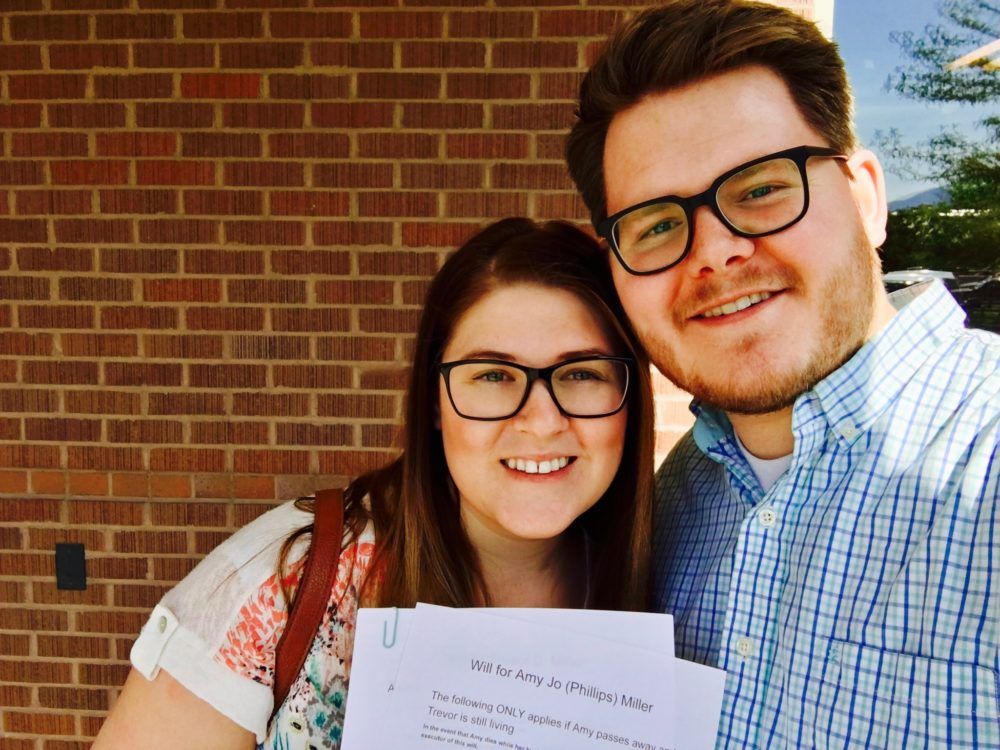4 Reasons You Should Write a Will & How to do it
By Amy Miller
Discussing the topic of dying is kind of depressing, I know. But death is also a reality. And unfortunately, for so many couples, it becomes a reality too early on in their marriage, and so unexpectedly. You can only prepare so much in these situations, but guess what? Making a will is something that you CAN prepare for.
After learning about wills and estates in a family finances class, I started realizing how important it is to have a will in place for your family’s protection, especially if you have many assets you want to leave behind for your spouse and children. SOOOO, Trevor and I created our own wills, as well as a joint will.
I got specific pointers from talking with an expert about how to go about doing this correctly on our own, rather than paying for legal help. It took us a few months but we ended up making them. The part that took the longest was actually printing them out and taking them to a notary, haha. However, a few weeks ago, we finally lifted that weight off my mind and finalized them! Peace of mind has swept over me from that for many reasons; reasons I will discuss in a second.

Because this subject is seldom talked about among couples of all ages, I wanted to make sure I talked about this on Freshly Married. People don’t realize that when you die, It’s not a simple process to handle your estate, on top of having to deal with the grief of such loss! So in this article, I’m outlining the reasons you should write a will, and a few guidelines I’ve been told and have researched on how to create one yourself!
*Please note that I am not an expert in the legalities of this. I’m going off of advice from what a retired judge instructed me to do, and through a few estate planning websites that I was referred to. Of course, it’s best to go through an attorney if you have that opportunity, which I plan to do when we have children. Something is better than nothing though, and these tips below will help you do at least something.
REASONS YOU SHOULD WRITE A WILL
- So that your family has clear instructions on how to divide your things, whether you’ve given a lot of specifics or not.
- Because the state can actually take possession of your things in the absence of a will. Most states have an intestacy law where your property is given to your closest relatives, obviously starting with your spouse and/or children. However, there are some states where they only give the spouse ⅓ of the property and possessions.
- It can be a huge way to lessen the stress on your spouse and/or children, especially when they are needing time to grieve
- You are in control of who becomes the guardian of your children, rather than letting the courts decide.
GUIDELINES FOR CREATING YOUR OWN WILL
Basically, a will or “last will and testament,” is a statement of your desires. If you want it to happen, write it down. The idea is that even when you pass, you can still have some control of what is happening to your things, and your family. And I don’t know about you, but I would want to be as in control as possible.
If you want to handwrite your will, it is called a holographic will. This does not need to be notarized. However, it can still be challenged in court, so when in doubt, get it notarized. Some states do not consider holographic wills legal, so make sure to check your state’s laws. If you type up a will, which we did, it obviously needs to be notarized in order to be valid. We just went to our bank and they were able to notarize it for us within 15 minutes.
Main Things to address in a will:
- Name an executor – a responsible person who will make sure your wishes are carried out.
- How you want your property and assets sold and divided up
- Appoint a guardian for your children
- Beneficiaries - Who receives what, and why (if you feel like specifying a reason)
- Burial preferences
OTHER IMPORTANT NOTES
- You have to have your own individual will. Even if you and your spouse has the exact same wishes, meaning that your wills are identical. You each just have to sign your own anyways.
- Consider providing reasoning for your decisions. If you have put something in your will that might offend someone, it might be a good idea to provide a little reasoning for your decision. This can be helpful in a scenario like the one below, where the judge makes a final decision.
- Consider specifying if you don’t want something in your will to be contested. If someone disagrees with one of your wishes, it can be contested (challenged in court) unless you say, “This is not contestable” or “This is not to be contested.” This is especially important when it comes to the custody of your children. If someone contests the newly appointed guardian, then the judge will decide where the children will go, which may or may not be what you wanted in the first place.
- You need to address certain death scenarios. This part requires more explanation. When creating the main part of your own wills, create it in mind if only you died, and not your spouse. Then as the next part of your will, address the scenario if you and your spouse die at the same time. For my part of the will, I wrote “If Trevor and I die simultaneously, Trevor dies first.” (Meaning that his will is what they will refer to for both of us). Then on this part of HIS will, he wrote, “If Amy and Trevor die simultaneously, refer to the following will.” We then wrote out the specific desires and instructions for if we both died.
- Options for what to do with your will when you’re done making it: keep a copy on you in a records box, keep an electronic copy and tell someone how to access it if you die, send a copy to someone, or put it in a safety deposit box.
- Once you have created a will, update it through various life events, like with each child you have, when your assets and income increase, or a life-threatening illness happens (heaven forbid!).
- Each time you update your will, shred the old one.
- Other preparations: Make sure someone can receive the money in your bank account… You have to do this through the bank by assigning a person’s name to a “payable on death” note, in case both you and your spouse pass away.
I really don’t want to scare people with all the details of doing this. It can seem very intimidating but like I said above, it’s better to go through a little uncomfortableness NOW rather than putting you or your spouse in more stress later down the line. I’m so relieved we did, as weird as it was to think about. And now that we have done the legwork already, we only have to make little changes as the years go on.
